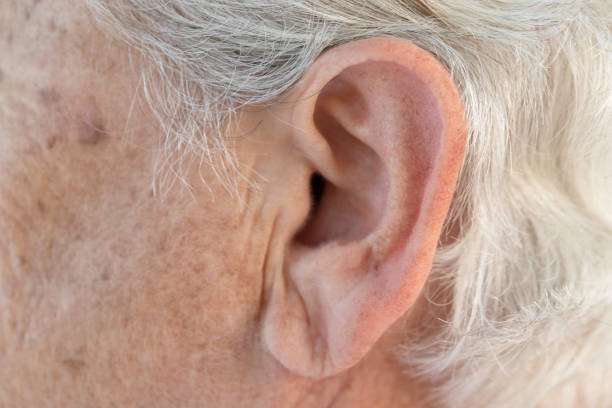Ageing & Hearing Loss - A Guide
This guide is for anyone worried about or currently experiencing Age-related hearing loss.
In this guide we’ll talk about how and why Age-related hearing loss occurs, how to test your hearing and most importantly how to maintain good overall ear health throughout our ears natural ageing process.
Does your hearing reduce as you age?
Yes, as we age our hearing and other senses undergo changes which can impact our perception of the world. Age related hearing loss is also known as Presbycusis, it is a common condition where hearing deteriorates gradually over time. This is due to changes that can occur in the inner ear structures and nerve pathways from the ear to the brain.
There are many factors that can play a role in these changes such as genetic factors, exposure to loud noises and health conditions. The signs of age-related hearing loss can begin subtly with symptoms such as slowly losing the ability to hear high frequency sounds, trouble hearing conversations in busy environments and difficulty distinguishing sounds.
Our ears are not the only senses that can be affected by aging; it becomes harder to see in dimmer light, our taste buds dull, our sense of touch can become less sensitive and our sense of smell declines. However, these changes are part of the natural ageing process, and if you are experiencing any adverse or extreme changes to your senses then seeking medical advice is recommended.
What are the normal hearing ranges by age bracket?
8000hz: Anybody without a hearing impairment.
12000hz: People under 50.
15000hz: People under 40.
16000hz: People under 30.
17000hz: People under 24.
What are causes and factors of hearing loss associated with ageing?
Wear and Tear
Age-related hearing loss primarily occurs due to wear and tear on the delicate hair cells in the inner ear (specifically the Cochlea). As these cells degrade the signals, they send to the brain are altered, affecting our ability to perceive sounds accurately and resulting in hearing loss.
Genetics
Genetic factors can play a part in Age-related hearing loss, although the exact mechanisms are not fully understood, recent heritability studies suggest that there are specific genes associated with hearing loss.
Prolonged Exposure to loud noises
Prolonged exposure to loud noises can permanently damage hair and nerve cells in your inner ear. Once damaged they are unable to send signals to the brain to be interpreted as sound as well as they once did. Exposure to loud noise can also cause a condition called Tinnitus (a high-pitched ringing, whooshing or roaring sound) coming from inside the ear, Tinnitus is often associated with hearing loss.
Earwax Impaction and Build up
Earwax blockages increase with age. As the body ages there are changes in the glands in the ear, these changes make earwax drier. Having drier earwax makes it harder for the ears to effectively clean themselves often causing a build-up resulting in hearing loss.
Head Trauma
When there is trauma to the head critical parts of the ear such as the ear drum, ossicles (small bones inside the ear) and hair cells can be damaged. If damaged, they can affect the ears’ ability to process sound as they play an important role in the transmission of sound waves to the brain. Trauma to the head can also cause neurological issues and affect your hearing if the brain region responsible for processing sound is damaged.
Smoking
Carbon monoxide and nicotine from cigarettes lower blood oxygen levels and constrict blood vessels within the inner ear. Smoking has also been linked to tinnitus, eustachian tube irritation and increased sensitivity to sound.
How is hearing loss tested?
Hearing tests are carried out by specialists known as audiologists. During a hearing test an audiologist will check your ears using a small camera to see the health of your ear canals and ear drums. Then you will undergo two tests: an Audiogram and a Bone Conduction test.
During an Audiogram an Audiologist will give you headphones and play different sounds into your ears. They will change the intensity and volume of the sound at different intervals and ask you to signal when you hear the sounds. This will show the lowest tones you can hear at different frequencies. A bone conduction test is used to check if there is any wax or fluid blocking your ear canal. A small device is placed behind your ear or on your forehead. The device then sends audio tones straight to your inner ear via vibrations in your skull. The test helps specialist determine if the problem is with your outer or inner ear.
Can I do a hearing test at home?
Yes, you can do a hearing test at home. The NHS recommends the RNID’s (Royal National Institute for Deaf People) at home online test for testing your hearing. There are also downloadable apps for your smartphone or tablet. Although online and at home hearing tests may give you some insight into any hearing issues you may have, they are unable to examine your ears structures, identify what’s causing the issues (i.e. reversible problems such as earwax impaction), and will be less precise. It is always advisable to see a specialist promptly if you suspect any hearing loss or issues with your ears.
Can age-related hearing loss be improved or fixed?
There is no fix for age related hearing loss, but it can be improved. One of the main treatments is the use of hearing aids. A hearing aid is a device placed in or around the ear and amplifies sound to improve the wearers hearing ability. An alternative device is a cochlear implant, cochlear implant is for people who are more profoundly deaf or hard of hearing, cochlear implants create electrical signals that the brain recognises as sound.
How can I prevent hearing loss as I age?
Age related hearing loss is a natural part of aging, however there are steps you can take to protect your ears:
Avoid prolonged exposure to loud noises by wear hearing protection or avoiding environments in which noise levels are high.
Control your blood sugar levels with help from a GP if you have diabetes.
Give up smoking.
Keep your ears clean – Earwax build up can cause hearing loss and issues within the ear canal.
One of the best ways to keep your ears clean and combat any Earwax build up or blockage is Micro-suction. Micro-suction is a safe and effective method to gently remove excess wax without water, using a gentle suction device.
If you have any concerns that Earwax build up may be exacerbating age-related hearing loss, any discomfort or just want to keep your ears healthy, contact us today!


